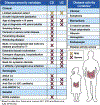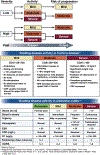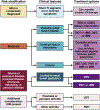Approach to the Management of Recently Diagnosed Inflammatory Bowel Disease Patients: A User's Guide for Adult and Pediatric Gastroenterologists
- PMID: 33940007
- PMCID: PMC8640961
- DOI: 10.1053/j.gastro.2021.04.063
Approach to the Management of Recently Diagnosed Inflammatory Bowel Disease Patients: A User's Guide for Adult and Pediatric Gastroenterologists
Abstract
Inflammatory bowel diseases (IBDs), including Crohn's disease and ulcerative colitis, are chronic, progressive, immune-mediated diseases of adults and children that have no cure. IBD can cause significant morbidity and lead to complications such as strictures, fistulas, infections, and cancer. In children, IBD can also result in growth impairment and pubertal delays. IBD is highly heterogenous, with severity ranging from mild to severe and symptoms ranging from mild to debilitating. Delay in IBD diagnosis, especially in Crohn's disease, is common and associated with adverse outcomes. Early diagnosis and prompt institution of treatment are the cornerstones for improving outcomes and maximizing health. Early diagnosis requires a low threshold of suspicion and red flags to guide early specialist referral at the primary provider level. Although the armamentarium of IBD medications is growing, many patients will not respond to treatment, and the selection of first-line therapy is critical. Risk stratification of disease severity, based on clinical, demographic, and serologic markers, can help guide selection of first-line therapy. Clinical decision support tools, genomics, and other biomarkers of response to therapy and risk of adverse events are the future of personalized medicine. After starting appropriate therapy, it is important to confirm remission using objective end points (treat to target) with continued control of inflammation with adjustment of therapy using surrogate biomarkers (tight control). Lastly, IBD therapy extends far beyond medications, and other aspects of the overall health and wellbeing of the patient are critical. These include preventive health, nutrition, and psychobehavioral support addressing patients' concerns around complementary therapy and medication adherence, prevention of disability, and ensuring open communication.
Keywords: Adult; Crohn’s Disease; Early Diagnosis; Early Therapy; Inflammatory Bowel Disease; Pediatric; Personalized Therapy; Ulcerative Colitis.
Copyright © 2021 AGA Institute. Published by Elsevier Inc. All rights reserved.
Conflict of interest statement
Conflicts of interest
These authors disclose the following: Jean-Frederic Colombel has received research grants from AbbVie, Janssen Pharmaceuticals and Takeda; has received payment for lectures from AbbVie, Amgen, Allergan, Bristol-Myers Squibb Company, Ferring Pharmaceuticals, Shire, Takeda and Tillots; has received consulting fees from AbbVie, Amgen, Arena Pharmaceuticals, Boehringer Ingelheim, Bristol-Myers Squibb Company, Celgene Corporation, Celltrion, Eli Lilly, Enterome, Ferring Pharmaceuticals, Genentech, Gilead, Iterative Scopes, Ipsen, Immunic, lmtbio, Inotrem, Janssen Pharmaceuticals, Landos, LimmaTech Biologics AG, Medimmune, Merck, Novartis, O Mass, Otsuka, Pfizer, Shire, Takeda, Tigenix, Viela bio; and hold stock options in Intestinal Biotech Development. Ryan C. Ungaro has served as a consultant and/or advisory board member for Bristol Myers Squibb, Eli Lilly, Janssen, Pfizer, and Takeda. He has received research support from AbbVie, Boehringer Ingelheim, and Pfizer. The remaining authors disclose no conflicts.
Figures





References
-
- Torres J, Mehandru S, Colombel JF, et al. Crohn’s disease. Lancet 2017;389:1741–1755. - PubMed
-
- Peyrin-Biroulet L, Loftus EV Jr, Colombel JF, et al. The natural history of adult Crohn’s disease in population-based cohorts. Am J Gastroenterol 2010;105:289–297. - PubMed
-
- Torres J, Billioud V, Sachar DB, et al. Ulcerative colitis as a progressive disease: the forgotten evidence. Inflamm Bowel Dis 2012;18:1356–1363. - PubMed
-
- Coward S, Clement F, Benchimol EI, et al. Past and future burden of inflammatory bowel diseases based on modeling of population-based data. Gastroenterology 2019;156:1345–1353.e4. - PubMed
Publication types
MeSH terms
Substances
Grants and funding
LinkOut - more resources
Full Text Sources
Other Literature Sources
Medical

